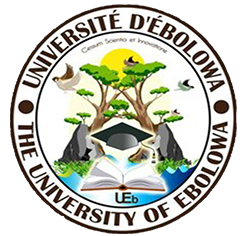FORMATION BILINGUE (FBI 161)
- Course name:FORMATION BILINGUE, FBI 116, Level I
- Instructor: Mr MVONDO ATOUBA Honoré
- Available, contact: 697 492 003, whatsApp: 664 343 533
- Delivery period: January to February
- Course division: CM: 22 hours; TD: 5 Hours; TPE: 3 hours; Credit Value: 2
Course Description
- This course is based on developing the language abilities of Engineering Students through an integrated approach that provides opportunities to develop their listening, speaking, reading, and writing skills.
- The course draws specific attention to the accurate use of structures, improvement of pronunciation, and development of active vocabulary in descriptive, narrative, and instructional texts.
- As Engineering Students, the course lays emphases on technical words in each field/series and promotes bilingualism.
Course Outcome
After completing this course, Student will:
• have improved their listening and reading skills in English
• be able to communicate in written and oral English with peers and teachers
• rely less on their first language and increase their use of English in formal and informal situations
• have a deeper understanding of correct English structures in descriptive, narrative, and instructional texts
• describe technical processes in their respective series in both English and French.
Teaching Units
| UNITS | TOPICS | DESCRIPTIONS |
| U.1 | GRAMMAR AND VOCABULARY IntroductionAbbreviations and definition of some scientific terms and their pluralsImportance of Science CommunicationParts of speech and Tenses Active and Passive Voices | Self / peers presentations and AbstractStudents should know some Abbreviations used in Sciences and the importance of science communication.Parts of speech (detailed); Regular and Irregular verbs When and how to use Active and Passive Voices |
| U.2 | SOCIAL INTERACTIONS Greetings; Gratitude; RegretsLetter writing (Formal, Informal, Query) Drafting a Curriculum Vitae (CV)Writing mechanics (format used in writing scientific papers) | This unit is aimed at developing Students’ social interaction in English and expanding their interpersonal skills. Through class activities, they actively converse in formal and informal contexts to congratulate, express gratitude, make invitations, and respond to speakers in oral and written contexts. The unit draws Students’ attention to understanding how grammatical patterns change according to purpose and audience. |
| U.3 | GIVING/ FOLLOWING DIRECTIONS Following and giving directions Giving clear instructionsDesigning instruction manuals | In this unit, Students learn how to follow directions from a map as well as how to give directions to search for a location or specific information. They learn how to follow and provide clear instructions. |
| U.4 | APPLICATIONS Writing numbers in figures/words Translation/ “faux-amis”Description of processes in respective series: Production of Electrical Energy Phases of a construction project Weather forecasting methods Wood transformation Etc. | This unit is aimed at helping Students to develop their bilingualism skills via better understanding of false-cognates in translation. Also they will be able to describe key processes using technical English, in their respective field/series of studies, thereby providing them a good foundation in their engineering studies! |
| / | END OF COURSE | CONTINUOUS ASSESSMENT (C.A) |
Mode of evaluation
| TYPE OF EVALUATION | AIM | PERCENTAGE |
| Student Practical Work | Enhance subject mastery (Student practical via Activities and Assignment) | 10% |
| Continuous Assessment | Evaluate understanding of the fundamentals of the course. (question type: structural and essay) | 20% |
| Semester Exam | Evaluate understanding of the whole course program. (question type: MCQs, structural and essay) | 70% |
Course Rules/Regulations
- Students are expected to be punctual and regular throughout the course delivery.
- Do and hand all assignments in time.
- Participate at all levels of the course delivery.
- Copy work is forbidden at all levels of evaluation.
- Be proactive and hardworking.
References
- www.usingenglish.com
- Teaching IELTS: Interactive Classroom Activities New
- T. K. Carver and S. Fortinos-Riggs, Conversation Book II – English in Everyday Life (New York: Pearson Education Limited, 2006).
- J. Eastwood, Oxford Practice Grammar. (Karachi: Oxford University Press, 2005).
- http://downloads.bbc.co.uk/worldservice/learningenglish/entertainment/ scripts/entertainment_shilpa_070717.pdf
- Wikipedia
Please follow and like us:
